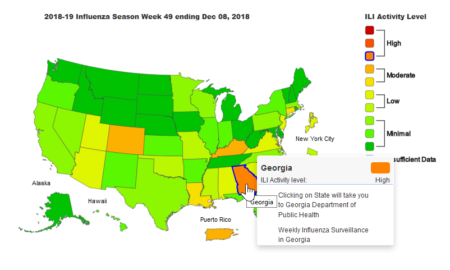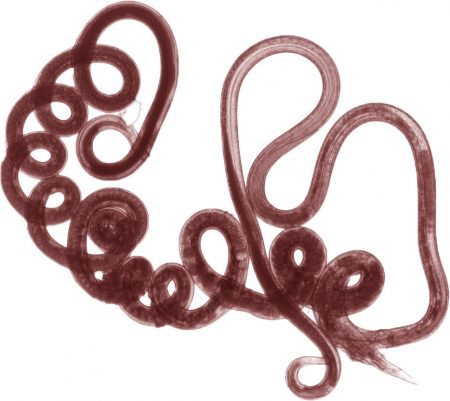Intestinal worms, electric bandages, where Georgia ranks #1, and more
21 Dec 2018
Posted by Andrew Kantor
Georgia leads the nation in flu
Yep, this year we’re the number-one state for the flu (so far), according to the CDC. We’re also the only state with “high” activity. That includes four deaths (one child, three seniors) and more than 159 hospitalizations.

… but we’re a bit healthier this year
Georgia moved out of the worst-10 states for health (according to UnitedHealth Group’s United Health Foundation) — we now rank #39 out of 50, up two spots from last year.
Hawaii, Massachusetts, Connecticut, Vermont and Utah are the five healthiest states of the year, while the five least healthy are Arkansas, Oklahoma, Alabama, Mississippi and, coming in last, Louisiana.
Drug prices: That didn’t last long
After a brief pause because of pressure from the White House, nearly 30 drugmakers are planning price hikes for January. (How do we know this? California has a new law requiring them to disclose upcoming increases.)
Apparently not all publicity is good publicity
Still ongoing is the big price-fixing case against 16 generic-drug manufacturers (we covered that on December 9). But now those companies want the judge in the case to impose a gag order on the investigators because they’re sick of reading about the case in the news.
What don’t they want the public to know?
- How many companies and drugs are involved (16 and more than 300, respectively);
- “the states’ purported conclusions about defendants’ pricing patterns” (the companies often raised prices in lockstep); and
- “details about the alleged harm and impact that the states believe to have occurred” (it cost taxpayers, insurance companies, and patients millions of dollars)
It’s cheaper to move to Europe than to get biologics in the U.S.
Biologic drugs in Europe cost patients a fraction of what they do here. The reason: Europe has more competition, better negotiators, and a system designed to support patients instead of drugmakers.
Notably, the U.S. has approved a total of six biosimilars; in Europe, it’s at least 50 — and that keeps prices down. Meanwhile American patent laws (“patent thickets, in which drugmakers win numerous patents to block competitors entirely”) stifle competition.
Occam’s Razor be damned!
If you have a patient with an upset stomach or nausea, don’t just direct him to the Pepto Bismol. Point out that he might have an intestinal worm.

Zap it
Electricity can help heal wounds, but who wants to be plugged in all day? To the rescue: self-powered electric bandages.
While it’s not fully clear how the pulses help, scientists noted that they increase the viability of fibroblasts (a kind of skin cell) and encourage them to line up, which is key to the healing process. The pulses also produced additional biochemical materials that contribute to tissue growth.
Elsewhere: New York can’t impose opioid surcharge
New York was planning to impose a surcharge on opioid makers — money to help fund addiction and recovery programs. But drug manufacturers didn’t believe they should pay for that treatment, and they challenged the law. Now a judge has ruled in their favor, saying the law violated the Constitution’s Commerce Clause.


